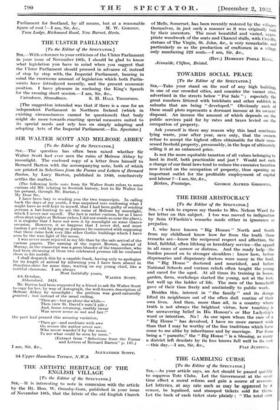SIR WALTER SCOTT AND MELROSE ABBEY
[To the Editor of the SPECTATOR.] SIR, —The question has often been raised whether Sir Walter Scott had ever seen the ruins of Melrose Abbey by moonlight. The enclosed copy of a letter from himself to Bernard Barton with the accompanying note, both of which are printed in Selections from the Poems and Letters of Bernard Barton, by Lucy Barton, published in 1849, conclusively settles the matter.
(The following little note from 'Sir Walter Scott refers to some curious old MS. relating to Scottish history, lent to Sir Walter for his perusal, through Mr. Barton.)
My Dear Sir, I have been lazy in sending you the two transcripts. In calling back the days of my youth, I was surprised into confessing what I might have as well kept to myself, that I had been guilty of sending persons a bat-hunting to see the ruins of Melrose by moonlight, which I never saw myself. The fact is rather curious, for as I have often slept nights at Melrose (when I did not reside so near the place), it is singular that I have not seen it by moonlight on some chance occasion. However, it so happens that I never did, and must (unless I get cold by going on purpose) be contented with supposing that these ruins look very like other Gothic buildings which I have seen by the wan light of the moon.
I was never more rejoiced in my life than by the safe arrival of the curious papers. The naming of the regent Morton, instead of Murray, in the transcript was a gross blunder of the transcriber, who had been dreaming of these two celebrated persons till he confused them in his noddle.
I shall despatch this by a capable frank, having only to apologize for its length of arrival by informing you I have been absent in Dumfries-shire for some time, waiting on my young chief, like a faithful clansman. I am always Most faithfully yours,
4th October, WALTER Scorr. Abbotsford. 1824.
Mr. Barton had been requested by a friend to ask Sir Walter Scott to copy for her, by way of Autograph, the well-known description of Melrose Abbey by moonlight ; the petition was good-naturedly granted ; but instead of the usual ending, "Then go—but go alone the while—.
Then view St. David's ruin'd pile ; And, home returning, soothly swear Was never scene so sad and fair !"
the poet had penned this amusing variation, "Then go—and meditate with awe On scenes the author never saw, Who never wander'd by the moon To see what could be seen by noon."
(Extract from " Selections from the Poems and Letters of Bernard Barton" p. 147.) I am, Sir, &c.,
ALEXANDER SCOTT.
84 Upper Hamilton Terrace, N. W.8










































 Previous page
Previous page